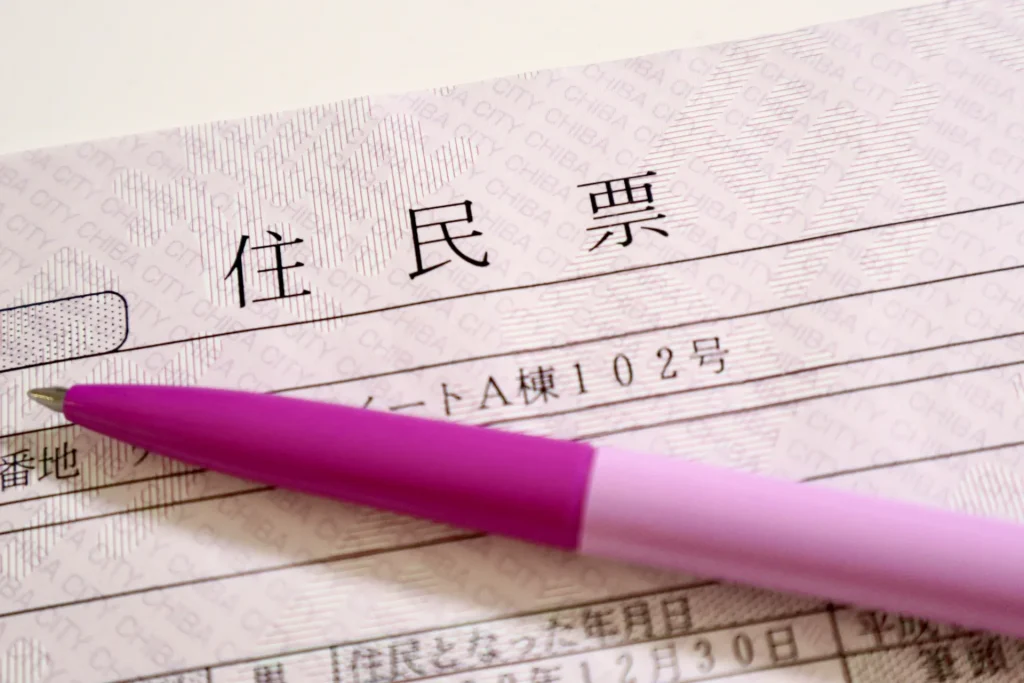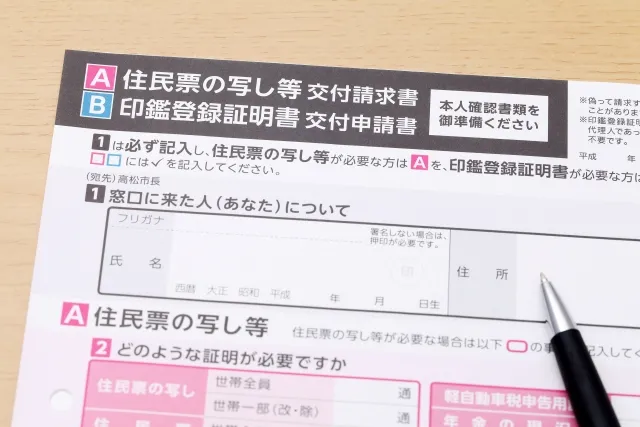What is a resident certificate (juminhyo)? Overview, when it needs to be created or moved, and how to obtain a copy.

Many foreign residents who have come to Japan from overseas but are not sure how to obtain a resident card are puzzled. Many may have questions about the proper timing for transferring their certificate of residence and how to obtain a copy of it.
A residence certificate is a very important document when newly settling in Japan from overseas or when moving to a new residence in Japan.
This article will provide a basic overview of the certificate of residence, specific situations in which the certificate of residence is required, when the certificate of residence must be moved, and even how to obtain a copy.
Please read to the end of this section to get a good overview of the Residency Certificate.
▼Goandup Picks Click here for recommended articles!
- Required before studying abroad! Goandup Nihongo+, an online Japanese language learning service
- This page introduces services for foreigners who wish to study in Japan or improve their Japanese language skills to learn Japanese online.
- Goandup Salon" community for foreigners living in Japan
- We introduce an online community where foreigners living in Japan can exchange information and interact with each other to support their life in Japan.
- Goandup Study" supports foreigners who want to study in Japan.
- This section introduces study abroad support services that provide comprehensive support to foreigners who wish to study in Japan, from preparation for study abroad to living in Japan.
- Where can I buy a prepaid SIM in Japan? Recommended SIM cards for foreigners are also introduced.
- How to purchase a prepaid SIM and suitable SIM cards for foreigners.
- The Complete Guide to Pocket Wi-Fi in Japan for Foreigners!
- We introduce how to select and recommend pocket Wi-Fi products that can be used conveniently in Japan.
- The Complete Guide to Finding a Job in Japan! Finding a job, changing jobs, and part-time work for foreigners
- This site provides foreigners who want to work in Japan with comprehensive information on how to find a job, recommended job sites, and other information necessary to find a job.
What is juminhyo?

A certificate of residence can be used when you need to give your address and prove it.
According to the "Act for Partial Revision of the Basic Resident Registration Act," a certificate of residence will be created for foreign residents as of July 9, 2012.
The information on the resident registration card differs depending on whether the applicant is a Japanese national or a foreign national. For foreign nationals, in addition to basic information about the applicant, various other information, such as information about insured persons (National Pension Insurance and Social Insurance), is included. Below is a list of specific information to be included.
Basic Information
- identity
- Date of Birth
- gender
- address (e.g. of house)
- nationality
- Personal Number (My Number): A number assigned to all residents of Japan.
- Date of resident registration in Japan as a foreigner: The date when the resident registration certificate was first created will be entered.
Matters related to the insured
- National Health Insurance Eligibility
- Eligibility for Long-Term Care Insurance
- Qualification for National Pension Plan, etc.
In addition, the matters written may differ depending on the duration and purpose of the stay, such as mid- to long-term, special stay, etc. For more information, please visit the website of the Ministry of Internal Affairs and Communications.
| (1) Medium- to long-term residents(Resident card holders) | Status of residence, period of stay, date of expiration of period of stay, and resident card number as indicated on the resident card to the effect that the applicant is a mid- to long-term resident |
| (2) Special Permanent Residents | The number of the Special Permanent Resident Certificate that states on the Special Permanent Resident Certificate that you are a Special Permanent Resident |
| (3) Temporary asylum seekers or provisional stay permit holders | The period of landing (as stated on the temporary asylum permit) or the period of provisional stay (as stated on the provisional stay permit) for which the applicant is a temporary asylum seeker or a provisional resident permit holder |
| (4) Transitional residents by birth or by loss of nationality | A statement that the applicant is a transitional resident by birth or a transitional resident due to loss of nationality |
When and how to make a "juminhyo" (certificate of residence)

For foreign nationals newly immigrating to Japan or planning to stay for a long period of time, the creation of a certificate of residence is one of the most important procedures.
Specifically, if you have decided on a residence in Japan and plan to stay for more than 3 months, you will need to obtain a certificate of residence. Please complete the procedure at the municipal office that has jurisdiction over your area of residence within 14 days of establishing your address.
Please be sure to bring your residence card with you when you go through the procedures. The resident card is used to verify address information during the procedure and is one of the required proof documents in the issuance of a resident card. At the municipal office, you can apply for a resident card along with the necessary documents.
Through the creation of a certificate of residence, you can officially record the start of your new life in Japan and establish a foundation for receiving the various official procedures and services required in your daily life.
When you need to transfer your "juminhyo" (certificate of residence)

There are two main cases when it is necessary to transfer a certificate of residence
- When a foreigner living in Japan moves to another part of Japan
- When a foreigner living in Japan moves abroad
When a foreigner living in Japan moves to another part of Japan
When a foreign resident in Japan moves to another part of Japan, the following procedures are required.
- Complete the notification of moving out at the municipal office of your current residence before moving.
- After completing the notification procedures for moving out, you will complete the notification procedures for moving in in the area where you will be moving to.
If you have a My Number card, you can easily complete the notification of moving out online using an online service called My Portal. This saves you the trouble of visiting the town hall and reduces the burden of the procedure. We recommend using this service by simply downloading the application and completing other administrative procedures online. For a detailed overview and instructions on how to use the application, please refer toclick hereThe information can be confirmed from the following
The procedure for moving-in notification must be completed within 14 days of establishing a new address. The Moving-in Notification procedure requires the "Moving-out Notification Certificate" issued at the time of the Moving-out Notification procedure. If you have completed the procedure for moving out using MyNa Portal, the only item you need to bring with you for the moving-in procedure is your MyNumber card.
Also, if you are planning to move in Japan, check out the following articles.
・How do I move in Japan? Explanation of procedures and formalities
・Explanation of procedures required for foreigners moving or changing jobs in Japan.
When a foreigner living in Japan moves abroad
As a general rule, a foreign resident living in Japan is required to apply for a notification of moving-out when moving his/her residence to a foreign country. Please note that unlike when moving within Japan, it is easy to forget to complete the procedure for notification of a change of address.
Two ways to obtain a copy of the "juminhyo" (certificate of residence)

A copy of your residence certificate is an important document that is required for various procedures. Here are the two main ways to obtain a copy.
(1) How to obtain the information at the counter of the municipal office of each city, town or village
A copy of your residence certificate can be obtained in person at the municipal office that has jurisdiction over your area of residence. When obtaining a copy, you may be asked to present a document that proves your status, so be sure to confirm what you need beforehand.
In addition, the hours of operation of town halls vary from municipality to municipality. It is recommended to check the hours of operation before visiting, especially on Saturdays, Sundays, and national holidays, as they are often closed.
(2) How to obtain from a copy machine at a convenience store
If you have a My Number Card, you can easily obtain a copy of your residence certificate by using a multi-copier machine located in convenience stores nationwide. This convenience store delivery service is very convenient because it can be used even outside the business hours of the town hall.
The hours of availability at convenience stores are generally from 6:30 a.m. to 11:00 p.m. daily, and the fee is 200 yen per letter, which is 100 yen cheaper than issuing at the counter (may vary depending on the municipality). We recommend that you check the website of your local municipality in advance for available convenience stores and fees.
However, some municipalities do not provide the convenience store delivery service, so you need to check in advance.
Reference:delivery at a convenience store
Useful information and support for living in Japan

Living in Japan is fascinating, but it is not uncommon to face many challenges due to language barriers and cultural differences. For example, you may encounter difficulties in all aspects of life, from using keigo (honorific expressions) in everyday and business situations, to difficulties in finding housing, using public services, preparing for the JLPT exam, and even meeting new friends and loved ones.
At such times, Goandup Salon will be your reliable partner!
Our community provides support and information to help foreign residents in Japan to make their life in Japan richer and more comfortable.
- Japanese Language Studywill meet the needs of all levels, from daily conversation to the use of keigo in business situations, to efficient Japanese language learning methods and preparation for the JLPT exam.
- livingaspect of the program provides concrete advice and information on how to establish a foundation for living in Japan, including explanations of Japanese culture and rules, finding housing, and how to contract public services and living infrastructure.
- Jobs & CareersRegarding the "what if" section, we can help you find a job, change jobs, and understand Japanese business etiquette and workplace culture, which are key to a successful career in the workplace.
- Travel & Dining Guidewill introduce you to hidden gems in Japan, must-try gourmet information, and other unique local attractions to help you experience Japan more deeply.
If you have any questions or concerns about life in Japan, Goandup Salon is here to help you! We will wholeheartedly support you to make your life in Japan smoother and more enjoyable.
For more information, click here ▼
summary
In this issue, we have introduced an overview of the resident card for foreign residents. The important points in the outline of the resident card are as follows.
- A certificate of residence is an important proof of address in Japan.
- Due to the "Partial Amendment to the Basic Resident Registration Act," foreign residents are required to have a certificate of residence from 2012.
- If you change your residence, such as moving from overseas to Japan, moving within Japan, or moving from Japan to overseas, you need to go through procedures at the municipal office to change the contents of your residence certificate.
- A copy of the certificate of residence can be issued at the municipal office of the municipality in which you live or at a multi-copy machine in a convenience store.
- Having a my number card makes it easy and convenient to complete move-out procedures and obtain a copy of one's resident card.
Procedures related to the resident card are an essential part of living in Japan. We hope that this article will deepen your basic knowledge of residency certificates and help you smoothly complete the various procedures you will need to follow in the future.
▼ The following articles are also recommended!
・What is the procedure when changing the address on a residence card? Required Documents
・I would like to know! Requirements to obtain permanent residence in Japan






